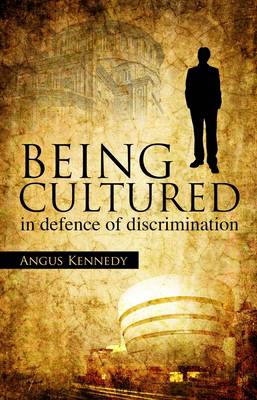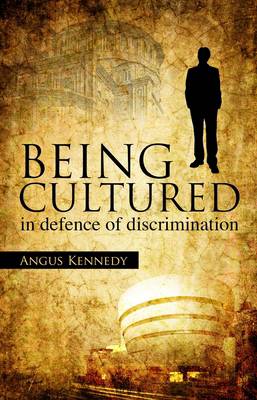
Bedankt voor het vertrouwen het afgelopen jaar! Om jou te bedanken bieden we GRATIS verzending (in België) aan op alles gedurende de hele maand januari.
- Afhalen na 1 uur in een winkel met voorraad
- In januari gratis thuislevering in België
- Ruim aanbod met 7 miljoen producten
Bedankt voor het vertrouwen het afgelopen jaar! Om jou te bedanken bieden we GRATIS verzending (in België) aan op alles gedurende de hele maand januari.
- Afhalen na 1 uur in een winkel met voorraad
- In januari gratis thuislevering in België
- Ruim aanbod met 7 miljoen producten
Zoeken
€ 40,95
+ 81 punten
Omschrijving
Today culture is everywhere as maybe never before. We read culture reviews, watch culture shows, live in Cities of Culture, and witness the Cultural Olympiad. Government, museums and arts councils worry that we are not getting enough culture and shape policy around notions of art and culture for all. Access and inclusion are in. Difficulty and exclusivity out.In "Being Cultured: in defence of discrimination" Angus Kennedy asks if this explosion of culture, and the breaking down of distinctions between high and low culture, has emancipated us or left us adrift without cultural moorings. Is it true that all cultures are equal? Is cultural diversity a good thing? Is it unacceptably elitist to insist on the highest standards of judgment? To argue that some cultural works stand the test of time and some don t? Can anyone dare to call themselves cultured anymore? Might it even be the case that culture no longer actually means anything much to us? That our nervousness about exercising discrimination and good taste the erosion of cultural authority might have left us with a culture that may be open to all, but lacking in depth? This provocative book strikes a blow for discrimination in culture and argues that there is a responsibility on each of us as individuals to always be becoming more cultured beings: our best selves. Kennedy revisits the tradition from Cicero to Kant, Arnold to Arendt of autonomy in culture: both in the sense of its intrinsic value and how it rests on our individual freedom quite apart from state and society to discriminate and judge. A freedom, without which, we risk a widening culture of consensus and conformity. But which is the constitutive element of a world in common."
Specificaties
Betrokkenen
- Auteur(s):
- Uitgeverij:
Inhoud
- Aantal bladzijden:
- 225
- Taal:
- Engels
- Reeks:
Eigenschappen
- Productcode (EAN):
- 9781845405700
- Verschijningsdatum:
- 1/11/2013
- Uitvoering:
- Paperback
- Formaat:
- Trade paperback (VS)
- Afmetingen:
- 136 mm x 213 mm
- Gewicht:
- 299 g

Alleen bij Standaard Boekhandel
+ 81 punten op je klantenkaart van Standaard Boekhandel
Beoordelingen
We publiceren alleen reviews die voldoen aan de voorwaarden voor reviews. Bekijk onze voorwaarden voor reviews.









